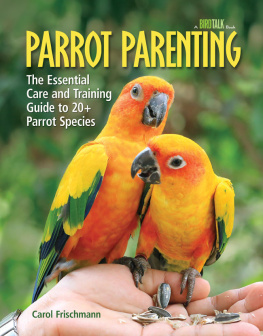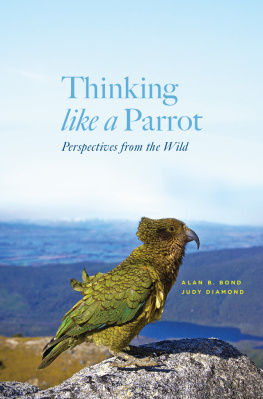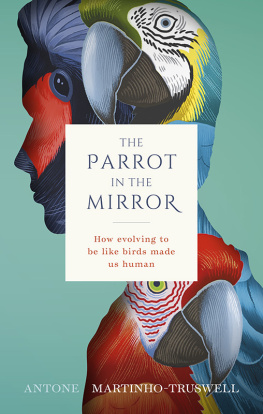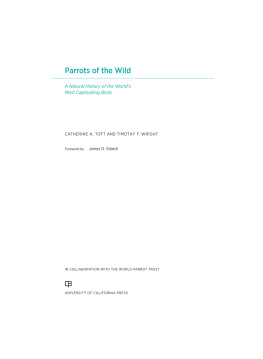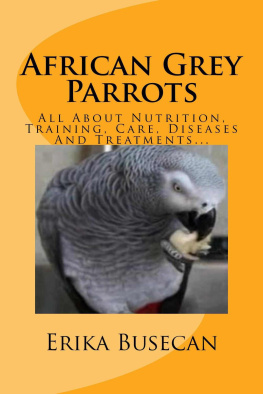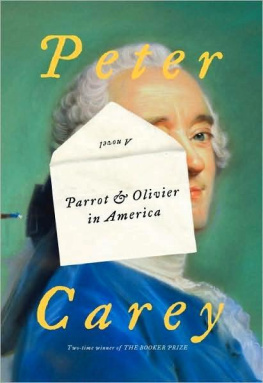1: The Pros and Cons of Life With a Parrot
Parrots engage us from the first moment we catch sight of them: Their feathers are gorgeous, they seem to represent an exotic landscape, and they are as interested in us as we are in them. If you have not spent a lot of time with a parrot, you may be surprised at the attention a parrot gives to every detail of a humans movement and tone of voice. And, in response, their attempts to get human attention are fascinating. The sounds they make, the way they move their bodies, the color of their feathers are interesting, but their fascination with us is gratifyingflattering even. Additionally, parrots take us from the mundane, ordinary life of our homes and lead us to imagine life in a foreign and magical place.
Introduction
Living as a companion of parrots for more than twenty-five yearscurrently with two African grey parrotsand as a writer about parrot behavior, biology, ecology, and husbandry (the keeping of what is essentially a wild animal in a human home), I can tell you that I would not be anxious to acquire a third companion parrot who was neither a cockatiel nor a budgerigar (parakeet).
The principal reasons for this come from the fact that a parrot is a wild animal, evolved to live in places where they fly miles each day, communicate with their flocks with loud calls, and where the detritus from their feeding serves a useful purpose. I and many of my parrot-loving friends have faced difficulties with neighbors over the noise that our parrots make. We tire of cleaning the mess that seems to reappear over the course of an hour. Our partners and friends resent the time, attention, and expense lavished on our birds. We wrestle with our conscience over the difficulty of providing an environment and companionship that is stimulating enough for an animal as intelligent and as persistent as a parrot can be. At times, we have talked with one another about our problems, sought solutions, engaged with consultants, and worked with veterinarians, nutritionists, and experts in animal behavior.
I have thought hard about how to open this book about a species that has brought so much pleasure and richness into my life. Psittacines, as parrots are called in scientific circles, are a very large and diverse group of birds. Mainly, they live in equatorial climates in the wild, and many of their habitats are disappearing at alarming rates. In fact, for some species of parrots, only the skills of aviculturists (bird breeders) have kept them alive.
Thousands of people around the world have dedicated their lives to studying, raising, and understanding this most fascinating group of birds. Whether a parrot belongs in your home or not is a very personal decision. What I can tell you echoes what everyone else I know who loves and respects parrots will say: think hard about your adaptability, your willingness to commit to a parrot for many years, and your ability to provide what your companion needs, including making trade-offs in order to spend time with your companion parrot.
In addition to being demanding, psittacines are so long-lived that scientists believe they hold a key to unlocking the secrets of staying young. As a result, anyone who has a parrot larger than a parakeet can expect that, unlike most other companion animals, the bird will live for fifteen to eighty years, depending on the species. (Consider this: many of us have difficulty committing to live with another member of our own species for that length of time!) Parrots not only speak a foreign language, but they also have needs that are completely different from our own. In addition, as companion animals, they are completely dependent on us for their well-being. This is a trust that begins the day you decide to bring a parrot into your home. My goal here is to help you envision, to the extent possible, what your experience of parenting a parrot can be. Depending on your expectations, the choice of species you make, and your flexibility, your experience can be either a lifelong and mostly positive experience or a frustrating and unhappy one for both you and your parrot. Lets look at both the positive and the potentially difficult aspects of this endeavor.
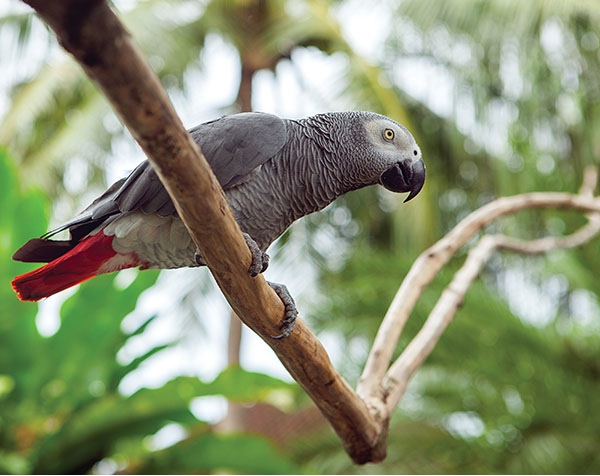
Parrots are only a few generations from their natural ancestors and are essentially still wild animals.
Why Keep a Parrot?
Companionship, admiration, and tradition are among the many reasons people choose to keep parrots. Parrots are good companythey are intelligent, interaction-seeking presences. Parrots sometimes want play but more often they seek a flock relationship: a contact call first thing on waking, a greeting when you return, a desire to be involved in whatever you do. Admiration and fascination for the parrot as a being is what initially draws people to these birds, and may be what grips some of us for a lifetime. Finally, some families have a tradition of keeping parrots. Adults remember their family parrots and want to provide that experience for their children.
Companionship
The United States census tells us that more people than ever are living alone. A friendly whistle and a bit of a talk in the morning may be just what you need to shake off some loneliness. Sharing an ordinary breakfast with a parrot offers you moments of genuine affection and reassurance. Your bird may ask to have his beak stroked or to go to your finger so that you can provide him with bites of your own breakfast, which will be infinitely more interesting than whatever you planned to feed him. Before heading out for a very busy day, having a few minutes just to talk things over as you change the paper and exchange yesterdays water for a fresh supply can be gratifying. This may be one of the high points of your dayjust the morning routine.
Parrots love their routines, and their needs help give our own lives stability and meaning. By providing for his needs in the way of food, toys, social interaction, and a clean, well-lighted place to live, you enjoy the daily constancy of a relationship. For people who have few demands in their lives, a companion bird provides a focus and a purposeful routine of care, feeding, and interaction. Sometimes, life with your parrot will be an unbelievably rewarding experience.
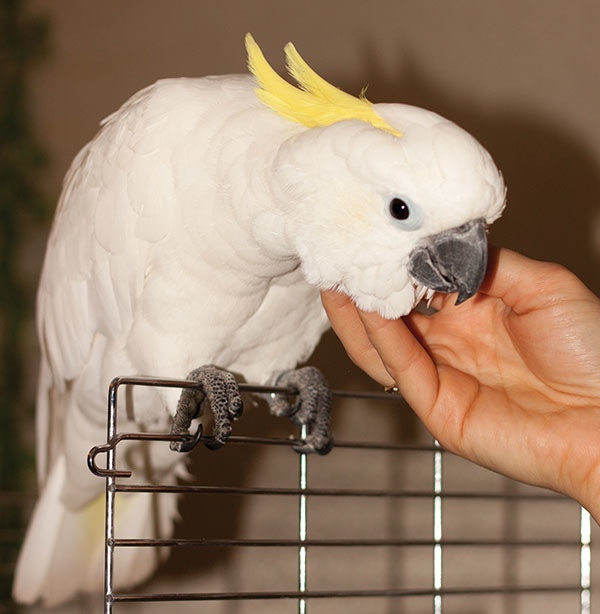
Well-socialized parrots are highly interactive and often affectionate companion animals.
Link to the Wild
For some of us, parrots provide a link to the wild that is otherwise missing in life. While living and working in cities or suburbs, we long to be elsewhere, living in a remote place filled with trees and the calls of monkeys and birds. In other words, the fact that a parrot is not a domestic animal, molded through thousands of generations of selective breeding to fit in with our lives, is exactly what were looking for. Before we head out for work, wed like to be reminded that there is something else in the world, something not quite so civilized as our version of life.
Lifetime Fascination
Some of us cannot stop admiring the beauty, the wonder, and the complexity of wild birds. We have to have birds in our lives. We cannot imagine life without birds as an integral part of each and every day. We realize that we not only need to have birds in our lives, but we work to preserve birds in their natural habitats so that their species can flourish. These are the people who join various national and international associations to support research into understanding companion and wild birds, and who promote their health and welfare, associating with others who also cannot stay away from these sometimes raucous companions. Even when our parrots are stubborn, we remember that they are doing what theyve evolved to do (at least we remember that most of the time!). What makes them difficult is also what makes learning about them so satisfying.
Next page
